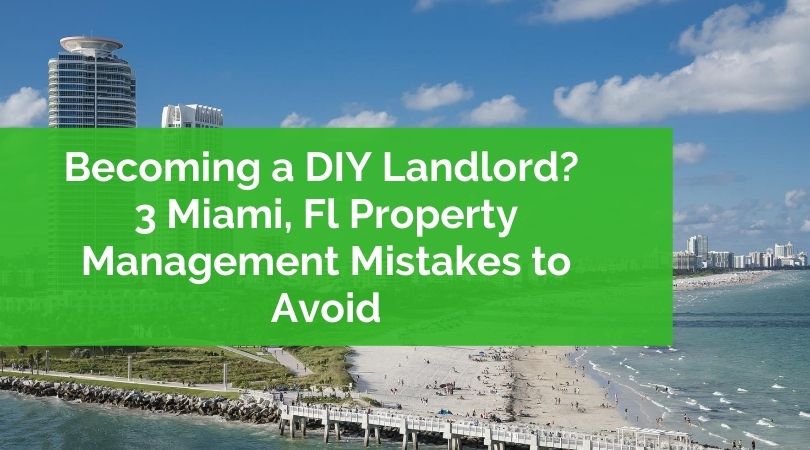
From juggling prospecting, tenant screening, property inspections, and maintenance, there's a lot that goes into being a successful landlord in Miami. When done right, though, it can be a wise and rewarding investment.
That said, as with any other industry, mistakes are bound to happen. And when they do, they can leave you high and dry with no revenue system – or even worse, leave you battling a legal quagmire.
It’s safe to say that property management isn’t the easiest profession. But, as long as you avoid making major mistakes, you can set yourself up for tremendous gain.
In today’s article, we're going to take a look at the 3 major property management mistakes to avoid when running a successful rental investment in Miami, Florida.
Mistake #1: Getting lazy with tenant screening.
Every day your property stays vacant, you're losing money. Consequently, as a property manager, you may feel the need to rush into filling the vacancy with any tenant that comes your way.
However, renting to a questionable tenant can be a much worse mistake. A problem tenant can cause excessive property damage and rental arrears, which makes landing a good tenant worth the wait.
To avoid such potential issues, you need to have a thorough tenant screening process in place. The following are a few things you can do:
Request an Application
Begin by requiring all prospective tenants to fill out an application form. You can get a template from your local real estate association, download one from the internet or create a personalized one using Microsoft office.

To make the form as effective as possible, make sure it lays down every detail. Make sure it encompasses vital information, such as personal, employment and financial information.
Run a Credit Check
The goal of checking a prospective tenant’s creditworthiness is to know whether the tenant is financially responsible or not. By ordering a credit report from agencies like Equifax, you may be able to find out about their previous financial history, going back up to 10 years.
Just remember to ask the prospective tenant’s permission before running their credit details, as the law requires it. If the tenant is hesitant to agree to it, that’s a potential red flag. Continue looking!
Contact Previous Landlords
This can help you learn a thing or two about the prospective tenant’s lifestyle. Some of the questions to ask former landlords include:
- Does the tenant have any rent arrears?
- Are you aware that the tenant is looking to move out?
- Did the tenant disrupt neighbors or cause issues while living there?
- Would you rent to them again in the future?
With a good tenant, you can rest easy knowing your Miami property is in the hands of the right person. Generally, a good tenant pays rent on time, takes care of the property and renews their lease at least once.
Mistake #2: Failing to do regular property inspections.
Regardless of how clean and responsible your tenants may seem, regular property inspections are critical to your success. For all you know, the property could be experiencing structural damage. There could also be instances where preventative maintenance would need to be carried out to prevent future problems.

Technically, the responsibility of notifying the landlord of maintenance issues lies with the tenant. After all, it’s in their best interest to live in a safe and habitable property. However, they can fail to notice potential problems or even fail to understand what impact the issue could have in the long-term.
Admittedly, the majority of tenants don’t have as much experience with maintenance issues as property managers.
So, what should you do to avoid potential maintenance issues? You need to carry out regular property inspections. Perform one immediately when the tenant moves in, another one during seasonal changes and another when they move out.
Remember, though, to make sure to notify your tenant before accessing their properties. Under Florida landlord-tenant laws, you must give your tenant at least 12 hours' notice before accessing their unit.
Mistake #3: Failure to understand the landlord-tenant law.
Ignorance of the law is not a legal defense!
The key to succeeding as a landlord is being aware of the law and what it dictates regarding both your rights and those of your tenant. Therefore, before renting out your property, make sure you understand the following laws:
- Security Deposit Laws - Every state, including the state of Florida, has laws concerning a tenant’s security deposit. This law provides guidelines relevant to things like how to store the tenant’s security deposit, how to store it and when to return it.
- Rent Control Laws - While Florida doesn’t prohibit landlords from increasing rent. It does, however, have laws that specify how landlords should do it. For example, how you must deliver the notice and under which conditions it can come about.

- Tenant Privacy Laws - As a landlord, you may enter your tenant’s home for reasons such as repairs, inspections, decorations, improvements or showing it to prospective tenants and buyers. You must, however, have your tenant’s permission to do it. The only exception to this is during times of emergency. In Florida, the notice period should be at least 12 hours.
- Fair Housing Laws - You must treat all tenants, both prospecting and existing, equally and fairly without discriminating them based on protected classes. The protected classes are marital status, national origin, ancestry, sexual orientation, familial status, disability, age, race, color, religion and medical history.
- Eviction Laws - A tenant has a right to continue living in their property until the landlord has followed the rightful procedure. Regardless of the violation committed, you cannot evict a tenant yourself.
The rights and responsibilities of each party to the lease are established under the Florida Landlord Tenant Act.
Landlording can be a rewarding experience if you do it right. It's a great way to diversify an investment portfolio and can be a great source of passive income for many years to come. Just make sure to avoid the common pitfalls like those aforementioned! If you're looking for help in managing your Miami property, contact Income Realty.





